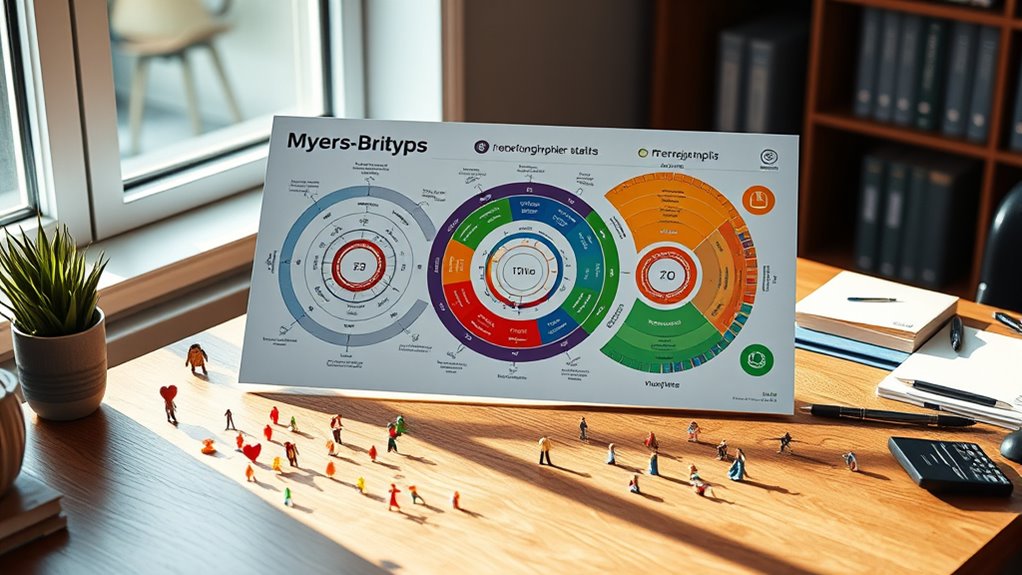Understanding your personality type helps you identify what strengths, tendencies, and challenges shape your behavior and relationships. Modern tools like MBTI or the Big Five make it easier to classify your traits, while knowing your profile can boost personal growth and improve decision-making. Recognizing your unique traits allows you to better understand yourself and others. Keep exploring, and you’ll uncover even more ways this knowledge can positively impact your life.
Key Takeaways
- Utilize established tools like MBTI and the Big Five to identify your personality traits and types.
- Recognize common profiles (e.g., INFP, ESTJ) to understand your behavior, strengths, and areas for growth.
- Consider online assessments and AI-driven feedback for accessible and personalized personality insights.
- Understand that personality traits influence decision-making, relationships, and personal development.
- Stay aware that personality can evolve over time, and ongoing self-reflection enhances understanding.
The Origins of Personality Classifications

The origins of personality classifications trace back to ancient civilizations that sought to understand human behavior. You can see this in the Hippocratic humors, where personality was linked to four bodily fluids—blood, yellow bile, phlegm, and black bile. Greek thinkers like Galen expanded this idea into the four temperaments: sanguine, choleric, melancholic, and phlegmatic. Theophrastus, a Greek philosopher, categorized personalities into distinct characters, laying early groundwork. Early attempts to link traits to brain anatomy, like phrenology, emerged but were later discredited. These early theories were heavily influenced by Greek and Roman culture, emphasizing the desire to explain why people behave differently. Additionally, the integration of AI in modern personality assessments is paving the way for more nuanced and data-driven models, building on these historical foundations. Recent advances in neuroscience continue to deepen our understanding of the biological bases of personality traits.
Modern Methods for Identifying Types

Have you ever wondered how psychologists today determine your personality type? Modern methods use advanced tools like the Myers-Briggs Type Indicator (MBTI), which classifies you into 16 types based on four dimensions.
Modern psychology uses tools like MBTI to classify your personality into 16 types based on key dimensions.
The Big Five model emphasizes traits like openness and neuroticism, offering a scientifically supported approach. Studies support the effectiveness of these personality assessments in understanding individual differences. Incorporating mindfulness practices into assessments can also help individuals gain clearer insights into their self-perception and emotional patterns. Additionally, understanding the cultural influences through cultural narratives can enhance the accuracy of personality assessments.
The 16Personalities NERIS model combines MBTI and Big Five traits for deeper insights. These tools benefit from digital literacy and online accessibility, making personality exploration more convenient.
Online assessments, such as Truity and Holland Code, make it easy to explore your personality from anywhere.
Technology plays a big role, with AI and data analytics refining results and providing instant feedback.
These tools offer a more detailed, personalized understanding of who you are, helping you make informed decisions about your career, relationships, and personal growth. Incorporating mindful decluttering strategies can also help clarify your self-perception and improve your overall well-being.
Common Personality Profiles and Their Traits

Understanding your personality type involves recognizing the common profiles that many individuals share, each with distinctive traits that influence behavior and preferences.
For example, if you’re an ISFJ, you’re likely compassionate, reliable, and dedicated to tradition. You tend to care deeply about others and take responsibility seriously. Personality traits also play a significant role in self-awareness and personal development. Knowing your personality assessment methods can help you identify your strengths and areas for growth more effectively.
As an INFP, you’re more introspective, creative, and idealistic, valuing emotional connections and personal growth. Recognizing these traits can help you better understand your motivations and how you relate to others.
ESTJs are practical, organized, and decisive, thriving on structure and loyalty. Their natural leadership qualities often make them dependable in team settings.
ENFPs are energetic, enthusiastic, and love exploring new ideas while valuing individuality and meaningful relationships. Their adaptability allows them to navigate change effectively.
Finally, if you’re an INTJ, you’re strategic, independent, and confident, often excelling in analytical and planning tasks. Understanding your personality profile can guide you toward fulfilling your personal and professional goals.
How Knowing Your Type Can Improve Your Life

Knowing your personality type can substantially enhance your overall well-being by helping you identify your strengths and areas for growth. When you understand traits like emotional stability, extraversion, and conscientiousness, you can leverage them to improve your life. Recognizing how your personality aligns with compatibility factors can further refine your relationships and social interactions. For example, recognizing that high neuroticism may cause stress allows you to develop coping strategies. Knowing your tendencies enables you to pursue activities that boost satisfaction, such as social engagement or goal-setting. This awareness also guides personal development, helping you target traits like self-discipline or openness to change. Over time, understanding your type supports better decision-making, stronger relationships, and increased resilience. Ultimately, this knowledge empowers you to make intentional choices that foster happiness and fulfillment.
Challenges and Future Directions in Personality Research

One of the main hurdles in personality research is integrating insights from multiple disciplines such as psychology, genetics, and neuroscience, which often operate with different methodologies and theoretical frameworks. You face challenges in combining these perspectives to form a cohesive understanding of personality. Additionally, environmental factors that shape personality remain underexplored, making it hard to grasp how external influences impact development. Methodologically, current assessments are often static, missing how personalities change over time. Advances in AI technology, such as natural language processing and machine learning algorithms, could facilitate the integration of diverse data sources, leading to more dynamic and comprehensive models. These technological tools can help analyze complex datasets from various fields, thereby enhancing our understanding of personality traits and their interactions. Cultural and contextual differences further complicate efforts to create universal models. Ethical concerns about privacy, bias, and data misuse also pose significant barriers. Looking ahead, researchers aim to explore traits beyond the Big Five, study personality across the lifespan, and develop culturally adaptable frameworks, promising a richer, more inclusive understanding of human personality. Furthermore, understanding the role of contrast ratio in visual perception could inform how environmental factors influence personality development by highlighting the importance of sensory experiences in shaping individual differences.
Frequently Asked Questions
Can Personality Types Change Over a Person’S Lifetime?
You might wonder if personality types change over your lifetime. The answer is yes, they can, though many traits remain stable.
As you age, you tend to become more emotionally stable and conscientious, but traits like openness and extraversion may decline.
Life experiences, major events, and your environment influence these changes.
Are Personality Types Influenced More by Genetics or Environment?
You might wonder if genetics or environment influences personality more. Both play pivotal roles, with genetics providing a baseline and environment shaping how traits develop.
Your upbringing, culture, and life experiences interact with your genes, creating a unique personality. While genetics offer stability, environmental factors allow for change over time.
How Accurate Are Online Tests in Determining True Personality Types?
Imagine peering into a mirror that reflects a flickering image of who you are. Online tests can be quite reliable, capturing about 80-90% of your personality traits if taken under the right conditions.
Frameworks like the Big Five tend to be more accurate, but results can vary based on environment and user perception. While some insights are solid, remember these tests offer a glimpse, not a definitive portrait of your true self.
Do Personality Types Differ Significantly Across Cultures?
You might wonder if personality types vary a lot across cultures. Research shows that while core traits like openness or extraversion are universal, their expression can differ due to cultural influences.
Social norms and ecological factors shape how traits are manifested. So, you’ll find similarities in traits but also notable differences influenced by culture’s social and ecological environment.
This makes personality both universal and uniquely shaped by cultural context.
Can Understanding Your Personality Type Improve Your Relationships Instantly?
You wonder if understanding your personality type can instantly improve your relationships. It’s possible because awareness helps you communicate better, recognize each other’s needs, and manage conflicts more effectively.
Conclusion
Understanding your personality type is like unfastening a secret map to yourself. It guides you through the twists and turns of your behavior, helping you navigate life’s challenges with confidence. As you discover your unique traits, you gain the power to shape your future intentionally. Embrace this journey of self-awareness—your personality is a vibrant mosaic, and each piece brings you closer to living authentically and fully.









